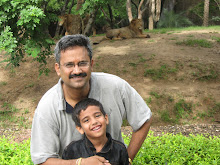Thursday, March 20, 2008
We do not want Sarabjit in exchange for terrorists: wife
http://www.hindu. com/2008/ 03/20/stories/ 2008032060470100 .htm
Amritsar: In a bold statement on Wednesday, the wife of Sarabjit Singh said the family did not want him repatriated from Pakistan if it meant India releasing some terrorists in exchange.
"Myself and my daughters would never like Sarabjit freed in exchange for any hardcore Pakistani terrorist lodged in Indian jails," Sarabjit's wife, Sukhpreet Kaur, told PTI.
Ms. Kaur said that for the family, "nothing is above the nation and we can't go against the interests of our motherland."
Sister's visit
She said the family was informed by journalists that Sarabjit's sister Dalbir Kaur would be going to Pakistan and the government had assured her a passport and visa.
"I would urge the government to give me and my daughters travel documents for visiting Sarabjit in the Kot Lakhpat Jail," she added. - PTI
Wednesday, March 19, 2008
Setting Standards through Community Binding
An oasis of abstinence
Author: Shyamlal Yadav ; Publication: India Today; Dated: March 13, 2008
Author: Shyamlal Yadav ; Publication: India Today; Dated: March 13, 2008
As far as villages and Indian values go, Miragpur in Uttar Pradesh stands out as an examplary model of social conduct. Not only do people here keep away from tobacco, liquor and non-vegetarian food, they also do not consume cabbage, garlic and onion. This is a tradition they have been following for over 400 years- since the seventeenth century. Even the hukka, synonymous with north Indian villages, is frowned upon here.
Located near Deoband of Saharanpur, around 120 km from Delhi, Miragpur has a population of around 10,000. The village is proud that only two shopkeepers,out of a dozen, sell bidis and cigarettes.
Says Rajpal, a shopkeeper: "Only two shops have started storing bidi and cigarettes and that too for labourers from other states." According to the villagers, the unique tradition started in 1610 AD when mendicant Baba Faqira Das settled down here. The villagers, who still recall his saying,
"Jovan, dhan, jal nadi ka aur megha ki chhaon; kahe faqira sthir nahi, jaise jal par nao," (Youth, wealth, river water and the shade of clouds are not constant, like a boat on water), have built an ashram in his memory and offer prayers twice a day.
This is a tradition that is followed religiously. Says, village pradhan Karan Pal, "Once our daughters marry, they are free to decide whether they want to follow these traditions, but it is mandatory for our daughters-in- law to follow these once they step into the village." A fair, held in the first week of March every year, brings together their relatives from far flung places across the country.
The village which is located on the bank of river Kali is dominated by Gujjars but has a significant number of other castes-Valmiki, carpenters, Brahmins and Dheemars-as well.
The villagers are steadfast about their beliefs. Says Ompal Singh, a villager, "We do not let off the violators. Sometimes we punish them and at other times our guruji punishes them."
But they are not usually harsh on violators as they believe their guruji will take care of that. They say some families were wiped out due to unnatural deaths when they did not follow the tradition. The Gujjars strictly enforce prohibition and other restrictions amongst their community but allow other castes to take their own stand.
Ompal adds: "Though it is voluntary among other castes but they also follow these usually." But it is remarkable that the village, located in one of the richest farming areas, does not need either a campaigner or an activist minister to rid them of smoking and alcohol.
Located near Deoband of Saharanpur, around 120 km from Delhi, Miragpur has a population of around 10,000. The village is proud that only two shopkeepers,out of a dozen, sell bidis and cigarettes.
Says Rajpal, a shopkeeper: "Only two shops have started storing bidi and cigarettes and that too for labourers from other states." According to the villagers, the unique tradition started in 1610 AD when mendicant Baba Faqira Das settled down here. The villagers, who still recall his saying,
"Jovan, dhan, jal nadi ka aur megha ki chhaon; kahe faqira sthir nahi, jaise jal par nao," (Youth, wealth, river water and the shade of clouds are not constant, like a boat on water), have built an ashram in his memory and offer prayers twice a day.
This is a tradition that is followed religiously. Says, village pradhan Karan Pal, "Once our daughters marry, they are free to decide whether they want to follow these traditions, but it is mandatory for our daughters-in- law to follow these once they step into the village." A fair, held in the first week of March every year, brings together their relatives from far flung places across the country.
The village which is located on the bank of river Kali is dominated by Gujjars but has a significant number of other castes-Valmiki, carpenters, Brahmins and Dheemars-as well.
The villagers are steadfast about their beliefs. Says Ompal Singh, a villager, "We do not let off the violators. Sometimes we punish them and at other times our guruji punishes them."
But they are not usually harsh on violators as they believe their guruji will take care of that. They say some families were wiped out due to unnatural deaths when they did not follow the tradition. The Gujjars strictly enforce prohibition and other restrictions amongst their community but allow other castes to take their own stand.
Ompal adds: "Though it is voluntary among other castes but they also follow these usually." But it is remarkable that the village, located in one of the richest farming areas, does not need either a campaigner or an activist minister to rid them of smoking and alcohol.
Subscribe to:
Comments (Atom)
